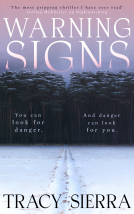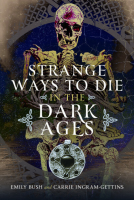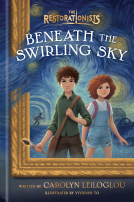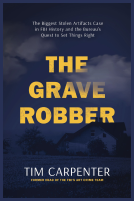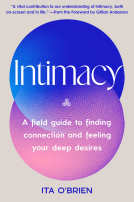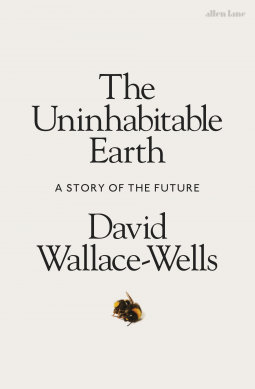
The Uninhabitable Earth
A Story of the Future
by David Wallace-Wells
This title was previously available on NetGalley and is now archived.
Send NetGalley books directly to your Kindle or Kindle app
1
To read on a Kindle or Kindle app, please add kindle@netgalley.com as an approved email address to receive files in your Amazon account. Click here for step-by-step instructions.
2
Also find your Kindle email address within your Amazon account, and enter it here.
Pub Date Feb 19 2019 | Archive Date Apr 16 2020
Penguin Books (UK) | Allen Lane
Talking about this book? Use #TheUninhabitableEarth #NetGalley. More hashtag tips!
Description
**SUNDAY TIMES AND THE NEW YORK TIMES BESTSELLER**
'If you read just one work of non-fiction this year, it should probably be this ... what this book forces you to face is more important than any other subject' David Sexton, Evening Standard
It is worse, much worse, than you think.
The slowness of climate change is a fairy tale, perhaps as pernicious as the one that says it isn't happening at all, and if your anxiety about it is dominated by fears of sea-level rise, you are barely scratching the surface of what terrors are possible, even within the lifetime of a teenager today.
Over the past decades, the term "Anthropocene" has climbed into the popular imagination - a name given to the geologic era we live in now, one defined by human intervention in the life of the planet. But however sanguine you might be about the proposition that we have ravaged the natural world, which we surely have, it is another thing entirely to consider the possibility that we have only provoked it, engineering first in ignorance and then in denial a climate system that will now go to war with us for many centuries, perhaps until it destroys us. In the meantime, it will remake us, transforming every aspect of the way we live-the planet no longer nurturing a dream of abundance, but a living nightmare.
Available Editions
| EDITION | Other Format |
| ISBN | 9780241355213 |
| PRICE | £20.00 (GBP) |
| PAGES | 320 |
Average rating from 55 members
Featured Reviews
 Librarian 431790
Librarian 431790
This is not a comfortable and easy book. It's scary, full of darkness and - unfortunately - realistic forecasts of things to come.
It should be read everywhere to raise concern and to make people take a stand.
I don't think a review is enough to describe how much this book affected me, it would take pages.
A very good book, it will make you think and may be act.
Highly recommended!
Many thanks to Penguin Books and Netgalley for this ARC
The most accurate terminology to describe this book: absolutely terrifying. It has the same impact a fantastic horror movie or novel does but with one very important difference - THIS IS REAL. If this doesn't wake earth's inhabitants up to our self-made, self-inflicted impending doom I don't know what will. I must add that this is so stark and horrifying that on the night I completed it I failed to sleep for thinking about everything David Wallace-Wells opens our eyes to. One of the hardest-hitting and thought-provoking works of nonfiction I've read in years, but it isn't for the faint of heart, and I've come to expect most people prefer to be ignorant to the truth rather than learning, accepting and then exploring ways to help make the situation better. However, it may already be too late, and unfortunately, this is one of those times where the adage "better late than never" does not apply.
If you're expecting a laid-back thesis on the ramifications of climate change then you have come to the wrong place; this is a wake-up call and a call to action. Time is no longer on our side in climate matters which is why books such as this are incredibly important. I have long been taught that if you cause something unexpected to happen that you at least try to put it right. It's like the object of civil liability in law which aims to put the victim back into the position they were in before the crime was committed, and whilst we can’t achieve that we can do things to change the destructive trajectory in which we are heading, but we must take heed and act post-haste.
All those seemingly subliminal messages we see, hear and internalise day in day out come together in this book and the author pulls no punches in bringing climate issues to readers consciousness and shouting loud and clear about the issues we face. His passion and commitment to the subject shine through, and although this holds some very scary messages there are also reasons to be hopeful. Ultimately, though, this is a masterful account of how we are well on our way to destroying our planet and ought to be in every school, public library and on the shelves of those of us who care about what the future will hold for our descendants.
Many thanks to Allen Lane for an ARC.
My thanks to Penguin Books U.K./Allen Lane for an eARC via NetGalley of ‘The Uninhabitable Earth: a Story of Our Future’ by David Wallace-Wells.
In July 2017 David Wallace-Wells wrote a long article for New York magazine that outlined a worse case scenario for the planet based on global warming. This is a book-length expansion of his original article.
This is an extremely important book that deserves a wide readership even if it makes for deeply distressing reading.
Since my teenage years I have tried to keep myself informed and also supported organisations such as Friends of the Earth, even though it has often seemed an uphill battle including seeking to control wildlife crime. Yet somehow the bigger, more serious issue has seemingly passed me by.
Wallace-Wells states in his owning section, ‘Cascades’, that in the following chapters he is not discussing the “tragic fate of animals” but instead concentrating on the costs to human lives. I found that I was relieved by this focus away from nature as I feared that I would feel overwhelmed.
However, he writes: “Any one of these twelve chapters contains, by rights, enough horror to induce a panic attack in even the most optimistic of those considering it. But you are not merely considering it; you are about to embark on living it. In many cases, in many places, we already are.”
Climate terror. Climate depression. Environmental grief. It was easy to feel all of these while reading and so I rationed myself and read only a few chapters each day. If I wasn’t reading and reviewing for an upcoming publication date I probably would have taken more time to absorb the material. Still, I don’t think any amount of time would have lessened the feeling of despair.
It is a very fact based work accompanied by copious notes at the end detailing his sources and allowing for further reading.
Thankfully although a very bleak picture, Wallace-Wells also writes: “I think you have to do everything you can to make the world accommodate dignified and flourishing life, rather than giving up early, before the fight has been lost or won, and acclimating yourself to a dreary future brought into being by others less concerned..”
A message to take to heart as the news almost daily recounts the reality of climate change and global warming. I feel that it is a book that I will be thinking a great deal about.
I hope to see it discussed widely and find a place in schools and libraries. Hopefully the message will also reach those who are in denial.
Readers who liked this book also liked:
Silvia Moreno-Garcia
Historical Fiction, Literary Fiction, Sci Fi & Fantasy
We Are Bookish
Historical Fiction, Literary Fiction, Multicultural Interest


